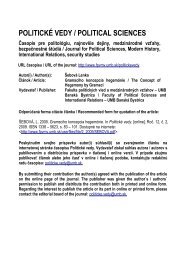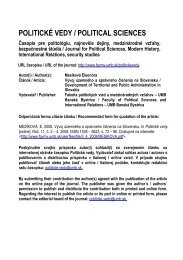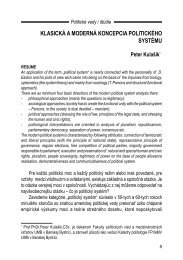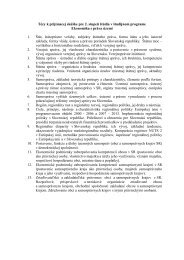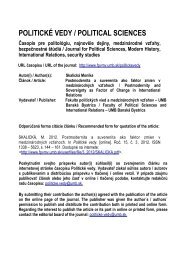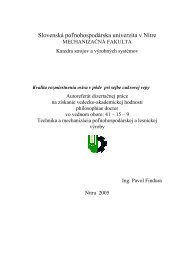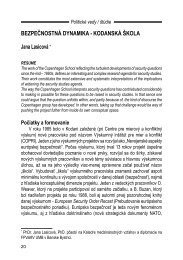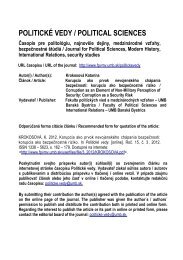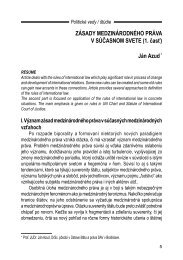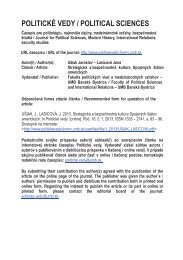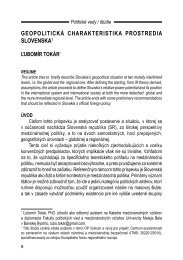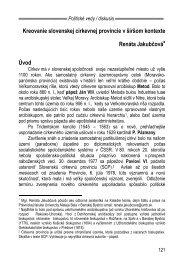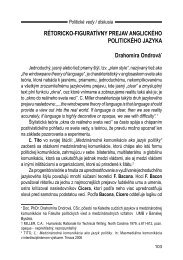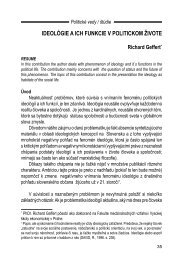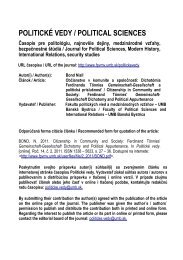- Page 1 and 2:
UNIVERZITA MATEJA BELA V BANSKEJ BY
- Page 3 and 4:
Zborník príspevkov z medzinárodn
- Page 5 and 6:
KUDLÁČOVÁ Blanka HISTÓRIA, SÚ
- Page 7 and 8:
PRÍHOVOR DEKANA PF UMB BANSKÁ BYS
- Page 9 and 10:
alebo domov zo školy. Iba 14,9 % d
- Page 11 and 12:
pracovníkom, ktorí sa zaoberajú
- Page 13 and 14:
a zanedbávaním. Keďže šikanova
- Page 15 and 16:
BENDL, S. 2003. Prevence a řešen
- Page 17 and 18:
ol schopný riešiť vlastné i spo
- Page 19 and 20:
spoločnosti. „Škola je súčas
- Page 21 and 22:
4. Bude sa môcť slobodne rozhodn
- Page 23 and 24:
(Vzorový školský vzdelávací pr
- Page 25 and 26:
PROKLAMÁCIA VS. INTERIORIZÁCIA MO
- Page 27 and 28:
Čo môže škola ako kamenná inš
- Page 29 and 30:
učiteľom. Ak zadáte študentovi
- Page 31 and 32:
ETHISCH-MORALISCHE ERZIEHUNG AN DEN
- Page 33 and 34:
Bergpredigt, Einsatz für soziale G
- Page 35 and 36:
erufsbegleitenden Ethiklehrgangs un
- Page 37 and 38:
• charakter definuje ako jednotu
- Page 39 and 40:
5. Starostlivosť (láskavosť) Sta
- Page 41 and 42:
Cieľovou skupinou sú deti prvého
- Page 43 and 44:
KURIKULUM ETICKEJ VÝCHOVY V PRIMÁ
- Page 45 and 46:
Ciele etickej výchovy sú bližši
- Page 47 and 48:
• Formovanie života - etika - re
- Page 49 and 50:
V Maďarsku, rovnako ako v Poľsku,
- Page 51 and 52:
• skúmať, odhaľovať a diskuto
- Page 53 and 54:
POLIACH, V. - VALIHOROVÁ, M. (2007
- Page 55 and 56:
Miera gramotnosti reprezentuje v in
- Page 57 and 58:
ozmeru (nachádzanie zmysluplnosti)
- Page 59 and 60:
Štúdia je súčasťou riešenia v
- Page 61 and 62:
prekročiť doteraz navyknutý hori
- Page 63 and 64:
diskusiu a usmerňovať mladých ľ
- Page 65 and 66:
dobre myslieť a uvažovať, poskyt
- Page 67 and 68:
dali konkretizovať, teda naplniť
- Page 69 and 70:
SCHERTZ, M., 2007. Avoiding ‘Pass
- Page 71 and 72:
druhom mieste vyučovacím ústavom
- Page 73 and 74:
etike pomenovala jadro celého jej
- Page 75 and 76:
jednotlivcov, samozrejme, pokiaľ o
- Page 77 and 78:
GLUCHMAN, V. 1997. Človek a morál
- Page 79 and 80:
1. Štátny vzdelávací program Ci
- Page 81 and 82:
KĽÚČOVÉ PRINCÍPY ETICKEJ VÝCH
- Page 83 and 84:
nevyhnutnú vstupnú fázu emocion
- Page 85 and 86:
a na ďalších siedmich sa nachád
- Page 87 and 88:
Záver Na záver možno konštatova
- Page 89 and 90:
Učebné osnovy etická výchova I.
- Page 91 and 92:
1. Kľúčové kompetencie a etika
- Page 93 and 94:
zásad. Konštruktívna účasť ti
- Page 95 and 96:
5. Tri úrovne prieniku etiky a eko
- Page 97 and 98:
Literatúra DŽUPKOVÁ, H. 2007. V
- Page 99 and 100:
sagen, die Teilchenkonfiguration, d
- Page 101 and 102:
Lampe zum Glühen zu bringen, das b
- Page 103 and 104:
Deshalb ist es von fundamentaler Wi
- Page 105 and 106:
AKÁ JE ETICKÁ VÝCHOVA NA SLOVENS
- Page 107 and 108:
pre pomoc, darovanie, delenie sa, t
- Page 109 and 110:
ANTHROPOLOGY AND ETHICS (Hungarian
- Page 111 and 112:
ounding off, but it renders resulta
- Page 113 and 114:
epresentation, literary work, film,
- Page 115 and 116:
FALUS K., JAKAB Gy., 1999. Erkölcs
- Page 117 and 118:
stratil a stráca sa ľudský, spol
- Page 119 and 120:
5. spôsoby a formy aplikácie prá
- Page 121 and 122:
WEIZSÄCKER, C. F. 1993. Člověk v
- Page 123 and 124:
k mimoľudskému bytiu. Preto vých
- Page 125 and 126:
sociálnej sféry na sféru, bez kt
- Page 127 and 128:
PROBLÉMOVÉ ASPEKTY KONCEPCIÍ ETI
- Page 129 and 130:
vychovávaného, ktorej základom m
- Page 131 and 132:
KOSOVÁ, B. 2007. Podstata edukáci
- Page 133 and 134:
predmetu etická výchova bola pôv
- Page 135 and 136:
Výsledky tohto experimentu a ich v
- Page 137 and 138:
a spoločnosť, umenie a kultúra,
- Page 139 and 140:
PETERSON, C. - SELIGMAN, M. E. (eds
- Page 141 and 142:
Renesancia nachádzala inšpiráciu
- Page 143 and 144:
ľudská v kontraste s ideou duše.
- Page 145 and 146:
spoločenstva detí a dospelých. T
- Page 147 and 148:
Metódy rozvoja mravných kvalít o
- Page 149 and 150:
ROZVOJ KOMPETENCIÍ V REALIZÁCII M
- Page 151 and 152:
Kompetencie v realizácii mravnej v
- Page 153 and 154:
Literatúra KUDLÁČOVÁ, B. 1997.
- Page 155 and 156:
O1 Program doplňujícího vzdělá
- Page 157 and 158:
k podpoření záměru zavést do R
- Page 159 and 160:
TVOŘIVOST A ZÁKLADY SPOLUPRÁCE
- Page 161 and 162:
TECHNOLOGY AND PROSOCIAL LABORATORY
- Page 163 and 164:
of the relevance of prosocial behav
- Page 165 and 166:
Giving or sharing Verbal help Verba
- Page 167 and 168:
• Verbal consolation • Confirma
- Page 169 and 170:
VERBAL CONSOLATION 21. Consoling so
- Page 171 and 172:
performed a prosocial behaviour tow
- Page 173 and 174:
a burden. She thanked me and her mo
- Page 175 and 176:
8. Consequences for the recipient:
- Page 177 and 178:
Podľa nej osoba je takým dobrom
- Page 179 and 180:
výučbou na jednotlivých stupňoc
- Page 181 and 182:
T1 Viacnásobné porovnávania medz
- Page 183 and 184:
Sme si vedomí limitov výskumných
- Page 185 and 186:
Cílem tohoto příspěvku je urči
- Page 187 and 188:
míru a harmonie. Morální pravidl
- Page 189 and 190:
Hypotéza Ch. Darwina spočívala v
- Page 191 and 192:
PLATO, Eutyfron, Praha- Oikomené 2
- Page 193 and 194:
(aktuálne) témy Objasnenie týcht
- Page 195 and 196:
100% 80% 60% 40% 20% 0% 40% 32% 29%
- Page 197 and 198:
2.3. Asociácia "dôležitosti" a "
- Page 199 and 200:
Záver Pojem kurikula chápeme v s
- Page 201 and 202:
MOŽNOSTI INKLUZÍVNEHO PRÍSTUPU V
- Page 203 and 204:
V obsahovom zameraní TC (Učebné
- Page 205 and 206:
Tematický celok Naša škola posky
- Page 207 and 208:
MRAVNÍ VÝCHOVA A ČESKÁ ŠKOLA P
- Page 209 and 210:
mravokárci byli vnímáni jako ti,
- Page 211 and 212:
Naopak základní podmínkou morál
- Page 213 and 214:
V rámci školy jsou doporučovány
- Page 215 and 216:
Rámcový vzdělávací program pro
- Page 217 and 218:
motivované tak egoisticky, t. j. s
- Page 219 and 220:
aktivitami, ktoré viedli k uvoľne
- Page 221 and 222:
V tabuľke 7 vidieť efektívnosť
- Page 223 and 224:
T16 Hodnoty získané z testovania
- Page 225 and 226:
Výsledky nášho výskumu nie je m
- Page 227 and 228:
Pýtať sa na zmysel svojho života
- Page 229 and 230: Ak teda zmysluplnosť životnej ces
- Page 231 and 232: Literatúra CSIKSZENTMIHALYI, M. 19
- Page 233 and 234: povinne voliteľný v alternácii s
- Page 235 and 236: 2. Komunikácia v cudzích jazykoch
- Page 237 and 238: • poradenská a konzultatívna,
- Page 239 and 240: BELZ, H., SIEGRIST, M. 2001. Klíč
- Page 241 and 242: • jej správanie je určované os
- Page 243 and 244: Významným komponentom štruktúry
- Page 245 and 246: a slovenské slovo mrav (z toho mra
- Page 247 and 248: NOWOCZESNA EDUKACJA I JEJ KULTUROWY
- Page 249 and 250: elementem, który kształtuje kompe
- Page 251 and 252: wiek dojrzały, w którym nie moŜn
- Page 253 and 254: DER ETHIKUNTERRICHT ALS „HERZENSB
- Page 255 and 256: Praxis an Basiswissen für wichtig
- Page 257 and 258: Küng schreibt: „Wir bedürfen de
- Page 259 and 260: Recht zu reden und zu denken gehör
- Page 261 and 262: egründen.“ 1 Dass der Mensch sic
- Page 263 and 264: (österreichischen Schulorganisatio
- Page 265 and 266: 1.2. Der Ethikunterricht in Österr
- Page 267 and 268: 3. Der Ethikunterricht vermittelt K
- Page 269 and 270: 1.2.2.1.1. Ziele und didaktische Gr
- Page 271 and 272: Sekundarstufe II - und warum mittel
- Page 273 and 274: Die SchülerInnen auf die gemeinsam
- Page 275 and 276: „Verpflichtung auf eine Kultur de
- Page 277 and 278: deutlich machen, dass ich alle Sch
- Page 279: der Befragten (Schüler) haben ange
- Page 283 and 284: 1.1. Aims and contents of ethical e
- Page 285 and 286: 1.2. Philosophy for Children (and C
- Page 287 and 288: metaphorically via persons of a pro
- Page 289 and 290: GLUCHMAN, V., 2008a. Etika a reflex
- Page 291 and 292: OPTIONS FOR CHANGE OF CURRICULAR CO
- Page 293 and 294: Educational merits of the subject 1
- Page 295 and 296: models in individual categories of
- Page 297 and 298: 6. Prognoses (projects, ideas, stra
- Page 299 and 300: The so-called class perspective was
- Page 301 and 302: School and influencing pupils´ cha
- Page 303 and 304: have similar status in this documen
- Page 305 and 306: ealisation of projects and characte
- Page 307 and 308: KATEDRA ETICKEJ A OBČIANSKEJ VÝCH



